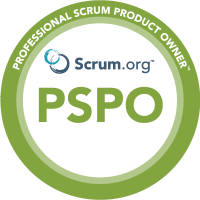
Professional Scrum Product Owner
- Practical product development management
Available as in-house training
Date and location of the in-house training to be agreed
Price: 945 EUR + VAT / person
Available as in-house training
Date and location of the in-house training to be agreed
Price: 945 EUR + VAT / person
Onsite/online training - 16h - 2 days each 8 hours (including breaks).
Training is provided in English. A Polish version is also available.
The training is intended for:
The Professional Scrum Product Owner™ training is intended for people with at least one year of experience in Scrum or who have already participated in an introductory course. People usually come with their own challenges that they would like to share and work together on the forum to develop improvements. If you are looking for an introductory training to Scrum, we recommend the Applying Professional Scrum™ training.
For online training, it is required to be computer literate and meet technical requirements: https://valkir.pl/en/online-training/.
Each participant completing the training will receive an non-expiring voucher to attempt the PSPO I assessment and 40% discount for PSPO II assessment. The assessment (in English) takes place online on Scrum.org website. In case of taking the PSPO I exam within 14 days and failing, the participant is entitled to a second attempt at no additional cost.
What is the Professional Scrum Product Owner™ training?
Professional Scrum Product Owner™ is an accredited training from Scrum.org, expanding knowledge and building essential competencies to perform the role of Product Owner. The form of the workshop, the spectrum of examples, techniques and tools allows to better manage the business value increment in a predictable and adapted to market dynamics way.
Program provides the essence of modern product management, prepares you to develop a product development strategy, taking into account requirements analysis, stakeholder management, shortening the feedback loop from real users, and on its basis, dynamic product adaptation. Participants in leadership and managerial positions will understand what a Product Owner does on a daily basis and how crucial it is for the entire organization to properly perform this role.
The role and accountability of the Product Owner, often misinterpreted and reduced to creating business requirements, will take complete shape after this training, building the awareness of a intrapreneur who constantly analyzes market trends, knows representatives of target user segments, monitors, measures and makes informed decisions what should, and what should not be developed.
Who is behind this?
Ken Schwaber and Jeff Sutherland are considered to be Scrum’s fathers, although the approach itself is based on self-organizing teams, popularized by the famous publication “The New New Product Development Game” written by Hirotaka Takeuchi and Ikujiro Nonaka, published in the Harvard Business Review in 1986.
Over 300 Scrum.org trainers around the world every day support the development of management by organizing practical training, learning through games, workshops and effective practices.
What benefits do you get?
The training allows participants to better understand their organization, the challenges it faces and more effectively steer its growth. It contains theoretical knowledge and practical methods taken from the idea of entrepreneurship, complexity theory, self-organization/self-management, business analysis, product management, change management and many other areas.
As a result of this training, participants from different areas of the organization will: